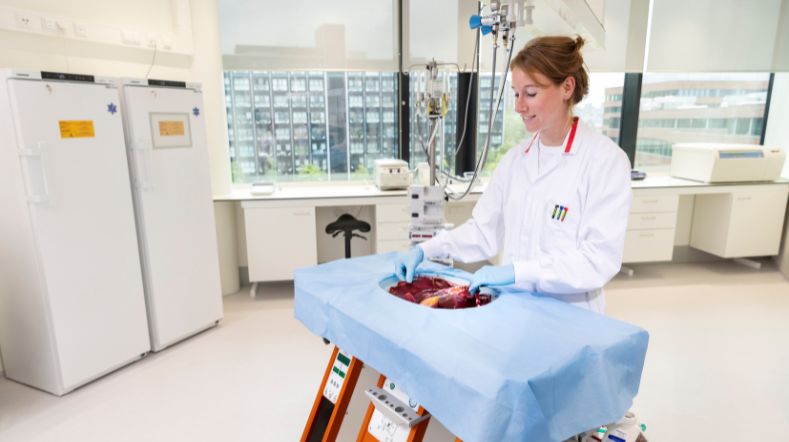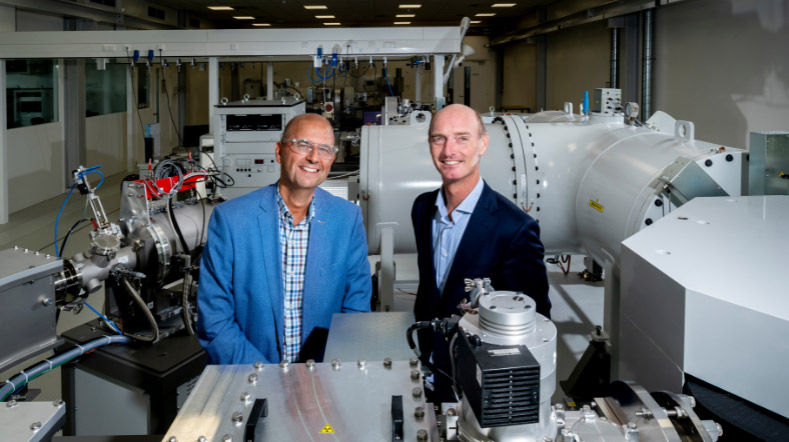
Improving your health ‒ starting with the gut microbiome
A healthy body largely begins in the gut. Our gut microbiome affects our digestion, our immunity, the risk of certain diseases, and even our mental health. But how exactly does the gut microbiome work? And how can we influence its functioning to make people healthier?
Research on the effect of nutrients
The human gut microbiome is as unique as our fingerprint. We inherit it from birth and once formed, it is difficult to change. However, external factors such as nutrition may well offer a chance to do so. Our gut health team not only analyses the functioning of the gut microbiome works, but also investigates the effect of nutrients on this complex system of microorganisms and our overall health.
Unlocking solutions for better gut health
A team of TNO specialists from different fields work closely together on microbiology, gut tissue, bioinformatics and business development, aiming to gain new insights into gut health. They have been busy developing innovative tools, partnering with other frontrunners for example in the food and pharma industries, and unlocking a wide range of solutions for better gut health, from diagnostics to therapeutic interventions.
Unique approach inside and outside the lab
TNO has been researching and forging partnerships in this field for decades, giving us the experience to develop models that closely resemble humans and can be tailored to specific research questions. Unique to our approach is that we combine microbiome and living gut tissue in a single model. In addition to these two pillars, we also include biology in our research. This means we look outside the lab and monitor people’s actual health, for example through questionnaires.
Relevant research fields for various target groups
TNO leads innovative projects focused on improving gut health that are of interest to health care professionals and companies in industries such as food, biotech and pharmaceuticals. One of our research areas focuses on the gut-brain axis, exploring how gut health impacts mental health and how nutrition can help. Another area of research is the effectiveness of pre- and probiotics to improve immune function and prevent gut inflammation. A third area is customised nutritional solutions: how can we personalise products based on individual gut microbiome profiles?
Advanced tools
To investigate the complex relationship between the gut microbiome and human health, TNO uses state-of-the-art tools including:
- i-screen: for in vitro testing of the interaction between nutrients and microbiota
- InTESTine: a model for studying the functioning of gut tissue, such as nutrient absorption, gut barrier function and the release of satiety hormones
- AI models that recognise patterns and predict health outcomes
- Apps that remotely monitor the effects on physical and mental health
Impact on more than just health
TNO’s models and tools provide a quick insight into the effect of certain ingredients or drugs on the gut microbiome and our overall health. This way, they help prevent disease, improve care,
reduce healthcare costs and promote personalised care. Another key benefit is that they help to reduce the need for animal testing.
Examples of public-private partnerships
Fontanelle is a public-private partnership. Together with three partners from the food industry, we are building a platform to research gut health of a specific population, namely infants and young children.
Over the next two years, we aim to adapt and apply our models in a context of this early stage of life, for example by using stool samples from babies and gut tissue from piglets. Ultimately, we will be able to make better predictions on the impact of nutrients, such as in baby food, on the gut health of babies and young children.
HuGTMI stands for Human Gut Tissue Microbiome Interaction. In this project, we work with two large food companies to build a third model that combines gut tissue and gut microbiome.
The major advantage of bringing those two models together is that it resembles how things work in the human body. Studying and influencing the interplay between living gut tissue and gut microbiome is key to human health.
No guts, no glory – TNO study into the health effects of fibre
As part of the TNO project ‘No guts, no glory’, we are investigating how we can use prebiotic dietary fibres to influence the gut microbiome in such a way that it has a positive effect on people’s physical and mental resilience. In the most recent study, using a randomised, double-blind, placebo-controlled approach, we used a fibre blend of acacia gum and carrot powder. We achieved a number of striking results.
- For the first time, it was shown that daily intake of prebiotic fibre can reduce negative emotions and specifically improve positive mood in women.
- Our in vitro models allowed us to predict clinical response, making it possible to tailor dietary fibre interventions more effectively.
- Despite microbiome shifts, we saw no significant effects on metabolic or inflammatory resilience.
This study opens up pathways for new partnerships aimed at developing personalised microbiome-based interventions to improve physical and mental health. If you would like to get involved, please do not hesitate to contact us.
Restoring gut health in ME/CFS with personalized interventions
Many people with ME/CFS (Myalgic Encephalomyelitis/Chronic Fatigue Syndrome) experience symptoms linked to an imbalance in the gut microbiota. This imbalance can disrupt intestinal metabolism and reduce the availability of key compounds for the rest of the body.
Together with partners, we are developing advanced laboratory models of the gut to:
- Study the microbiota composition of ME/CFS patients.
- Test interventions such as probiotics and prebiotics outside the human body.
- Explore how microbial metabolites affect the intestinal barrier.
- Link lab findings with clinical data to design tailored therapies.
Two innovative models are at the core of this project:
- i-screen®: to test how gut bacteria respond to interventions.
- InTESTine™: to study how microbial compounds interact with human intestinal tissue.
By combining clinical data with lab insights, we aim to identify effective, personalized strategies to restore gut health in ME/CFS patients and help guide more patient-focused clinical follow-up studies.
This multidisciplinary effort involves TNO, University of Groningen, UMCG, University of Vienna, and close collaboration with ME/CFS patient organizations in the Netherlands.
Make more impact with TNO
Do you work at a biotech company developing a new drug, a food company exploring the benefits of prebiotics, or are you a healthcare professional seeking a deeper understanding of gut health? Make more impact by partnering up with TNO.
We are currently putting together an innovative consortium that aims to gain more insight into the interaction between microbes and dietary fibre. Join us now to improve dietary fibre applications for a healthier gut microbiome and take a leap towards better overall health. Please contact us for more information.
Get inspired
Testing medicines outside the body: intestinal–liver–kidney model accelerates drug development


Preclinical ADME


TNO launches Peregrion to boost market impact of its technology that accelerates medicine development


PPP uncovers new insights into MASLD development


Translational preclinical efficacy models




